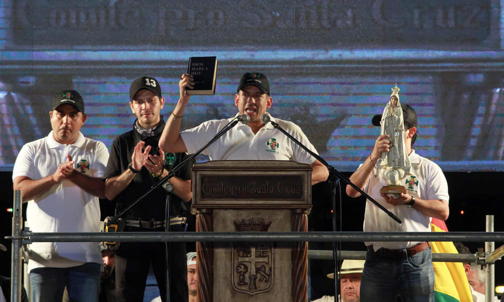
‘Satan, be gone!': Bolivian Christians claim credit for ousting Evo Morales
January 27, 2020 - Original article: The Guardian
Tom Phillips in El Alto
The fast-growing religious right – both Catholic and Protestant – see the president’s exit as a first step in transforming the country, leaving many indigenous Bolivians horrified.
https://www.theguardian.com/world/2019/dec/12/evo-morales-argentina-asylum-bolivia
Some blame the defenestration of Evo Morales on a racist, rightwing coup. Others credit a popular revolt against a leader who had overstayed his welcome.
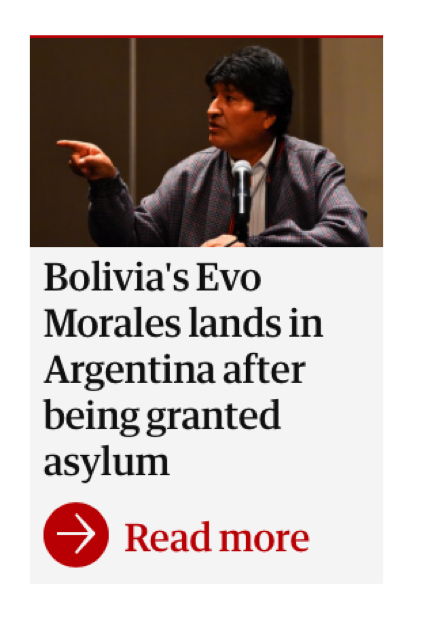 “The glory is God’s,” proclaimed the evangelical leader who heads a conservative coalition of Bolivian churches called the National Christian Council.
“The glory is God’s,” proclaimed the evangelical leader who heads a conservative coalition of Bolivian churches called the National Christian Council.
Aruquipa claimed that in the hours before Morales’s flight to Mexico the leftist received a divine decree: “Pharaoh, leave Bolivia in peace!”
“And I believe that just as He freed Israel from the Pharaoh of Egypt, He freed Bolivia from the Pharaoh Evo,” Aruquipa said, before declaring: “Evo’s era is coming to an end. And the era of Christ is being born.”
Aruquipa was on the frontline of Morales’s toppling last November, urging congregants to flood the streets in prayer and protest.
And his profoundly conservative worldview offers a glimpse of the South American country’s possible future as it gears up for fresh elections in which Bolivia’s fast-growing religious right hopes to catapult a supporter into power.
“[Under Morales] we were turning into a backwards nation – people wanted to legalize abortion, to legalize gay marriage, they wanted to legalize the satanistas!” complained Aruquipa, whose business card features an image of an unborn fetus and the slogan: “Thou Shalt not Kill. Abortion is murder!”
Irene Squillaci, a female pastor from Bolivia’s economic powerhouse, Santa Cruz de la Sierra, said she also saw “supernatural” support for Morales’s downfall.
“I see it as a battle between Good and Evil,” Squillaci said of the struggle between Morales’s foes and followers. She added that she hoped Bolivia would elect “an ally of the principles in which we believe”.
(below) Bolivia’s self-proclaimed interim president, Jeanine Áñez, a conservative Christian, speaks from the balcony of the Quemado Palace in La Paz with a Bible in hand. Photograph: Aizar Raldes/AFP via Getty Images
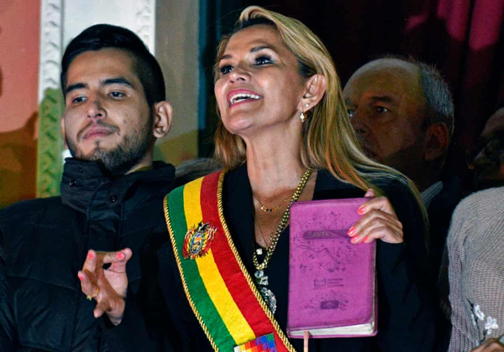
That ally seems most likely to come in the form of Luis Fernando Camacho, an ultra-conservative Catholic activist who led the charge against Morales following October’s disputed election and stormed Bolivia’s presidential palace with a Bible under his arm to celebrate his fall.
“God has returned to the palace,” Camacho, who is also from Santa Cruz, wrote on Facebook. “To those who did not believe in this struggle I say God exists and is now going to govern Bolivia for all Bolivians!”
Camacho is part of Bolivia’s Catholic majority, who form about 77% of the population, not one of the 16% who are Protestant.
But Aruquipa, a longstanding foe of Bolivia’s LGBT community, hinted he could back Camacho, calling him a fellow “man of faith”.
“It’s like Jesus said: ‘If these become silent, the stones will cry out.’ I believe that he has been used as a stone to elevate the church,” Aruquipa said of Camacho.
The prospect of a sharp turn to the religious right horrifies many indigenous Bolivians, whose traditions Morales sought to elevate (and, some say, exploit) – to the fury of hardliners such as Aruquipa.
Some see not only a threat to Bolivia’s indigenous customs and practices but also the country’s very status as a secular state, enshrined in Morales’s 2009 constitution. The swearing in of Bolivia’s rightwing interim president, Jeanine Áñez, with a giant Bible further fuelled such fears.
“They don’t respect our traditions. Just because we have ancestral and cultural traditions does not mean we are satanic,” said Arison Montes, a pro-Morales activist from El Alto, a largely indigenous city near La Paz.
“These people are coming here with their Bibles like in the colonial times … They are coming with their Bibles to lie,” the 27-year-old added. “And people are allowing their brains to be washed.”
Edmundo Pacheco, a Aymaran spiritual guide who was once close to Morales, accused “evangelical sects” of trying to destroy indigenous teachings and wisdom in Bolivia but vowed they would fail.
“They say we’re satanic, that we’re witches, that we destroy Jesus. Listen, I conduct rituals: rituals to nature, to the earth, to the spirits. I never even mention the name Jesus because it means absolutely nothing to me,” said Pacheco, 60.
(below) An Aymara priest, or yatiri, performs an Andean ritual to thank the Pachamama (Mother Earth) in El Alto, on 1 December 2019. Photograph: Jorge Bernal/AFP via Getty Images
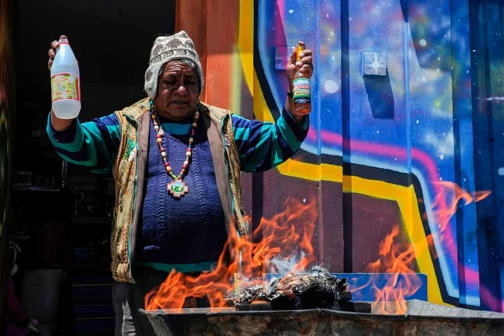
Within Bolivia’s Christian community there are also fears over the radical rhetoric being peddled by firebrand pastors who conflate Evo Morales with Satan.
At a recent demonstration in Santa Cruz, attended by Camacho, a banner reading ‘Jesus governs Bolivia’ was unfurled while one orator reportedly bragged that, with Morales’s exit, “all the demons of witchcraft have been tied up and cast into the abyss”.
“Satan: be gone from Bolivia! Now!” the speaker said.
Sofía Vargas, a La Paz-based pastor, said such “offensive” language undermined the evangelical “awakening” sweeping Bolivia and threatened her ability to proselytize.
But even more disturbingly it could spark violence. Vargas warned communities had the impression that just as “the Spanish came and brought the Bible and the crucifix and enslaved us … now they want to do the same again and have caused the exit of our representative [Morales]”.
“This is the message that is coming across and the church needs to work very hard to show that it is not like this,” Vargas said.
A victory for Camacho or Bolivia’s right is not guaranteed in next year’s presidential elections – scheduled for the start of May – even though Morales will not be running for the first time in 18 years.
Jim Shultz, founder of the Bolivia-focused Democracy Centre, said much would hinge on the strength of the candidate for Morales’s Movement Towards Socialism (Mas) party and the extent to which the right could unite.
“You’re definitely going to have a strong challenge from Camacho. But he might not be the only rightwing candidate,” Shultz said.
On Friday Áñez, who is evangelical, announced she would also run for president.
(below) A human skull decorated with sun glasses, a hat and flowers sit on display outside the General Cemetery chapel during the annual ‘Natitas’ festival in La Pazon 8 November 2019. The celebration blends Christian and traditional indigenous customs. Photograph: Juan Karita/AP
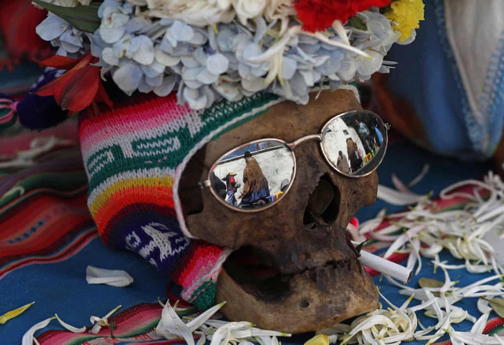
While their conservative agendas overlap on issues such as abortion, the extent to which Bolivia’s evangelical and Catholic churches might collaborate is unclear given their region-wide struggle for followers.
But during a public assembly in El Alto last November, Pastor Aruquipa was bullish.
“Today a new republic is being born, with new Christian and biblical values and principles,” he insisted.
As a charcoal-coloured sky loomed over a crowd of flag-waving demonstrators, the minister took to a makeshift stage to lead a politically charged prayer.
“When the righteous pray, God will answer,” he shouted. “God needs you. God needs us – to transform Bolivia. Amen!”
Additional reporting by Cindy Jiménez Becerra in El Alto